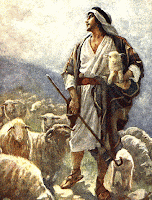Shepherd
There is no greater imagery in the New
Testament than the leader and caretaker of God’s people than “shepherd.” The
job description of the shepherds of the New Testament congregation is close, if
not identical to that of the Near Eastern shepherd.
The job description is as follows: -to watch
for enemies trying to attack the sheep - to defend the sheep from attackers - to
heal the wounded and sick sheep - to find and save lost or trapped sheep -to
love them, and to make sure the sheep have adequate food and water.
No domesticated
animal is as helpless and needy as sheep. Sheep happen to be the one animal
that cannot live on its own without the intervening help of a human being.
The problem with
most sheep is that they are stubborn, “self-willed” and difficult. There is no
doubt that sheep need strong leadership, constant care, and even discipline.
I love this
imagery. However, it is tragic when the “sheep” forget to whom their very own
Christ and Savior likened them. Today’s “sheep” (read average congregation member)
disregard the shepherd/sheep relationship and actually try to usurp the
position of the shepherds.
Today’s sheep
refuse the leadership and care of the shepherd. More and more we are seeing
today’s sheep refuse the “voice” of their shepherd and listen to the voice of “other”
or false shepherds.
Today’s sheep are biting, crowding, and attack both the
shepherd and the other sheep in the “flock.”
Just like in the
days of David, today’s sheep want to run off into fields with harmful and nutrition
less pastures. Today’s sheep run towards harmful water.
God has given a
tremendous responsibility and privilege to the leaders of the New Testament
congregation. These men are called “under-shepherds,” men who are under the
Great and Chief Shepherd, Jesus the Christ. God has charged these men with the
feeding, care, and protection of God’s precious sheep and lambs.
Hebrews 13:17
states, “Obey
those who rule over you. And be submissive, for they watch out for your souls,
as those who must give an account. Let them do so with joy and not with grief,
for that would be unprofitable for you.”
The writer of the
letter to the Hebrews admonishes the “sheep” of these various congregations to πειθω
(peitho) those who rule over them. Peitho is translated twenty two (22) times
as persuade and eight (8) times as trust. It is only translated as obey seven
(7) times. It is used some fifty five (55) times in the New Testament.
The writer of
Hebrews uses this word, peitho, five (5) times of those fifty five (55) times.
It is translated as “trust” or persuaded four (4) of those five times. It is
only translated as “obey” one time in the letter to the Hebrews.
I think the writer
actually said, “Be
persuaded [by their words, actions, position, appointment, and et. Cetera]
to be
submissive, [why?] for they watch are vigilant and watchful for your souls…”
Shepherds need to
be intimately and actively involved in the lives of their sheep. Shepherds need
to know everything they can about the sheep in their charge. They need to be
able to know how to reach them, correct them, how to teach them [according to their
own individual personalities]; they need to know how to help the sheep remain
happy, healthy, vibrant, and responsive to the Great Shepherd.
What a great job!


.jpeg)








